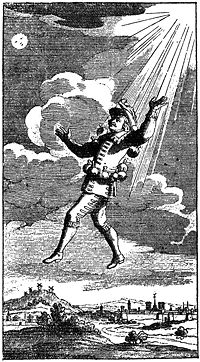You can help expand this article with text translated from the corresponding article in French. (May 2019) Click [show] for important translation instructions.
|
 Cyrano uses bottles of dew to float upwards. Illustration from the second volume of an edition of Cyrano de Bergerac's complete works printed in Amsterdam in 1708 | |
| Author | Cyrano de Bergerac |
|---|---|
| Original title | L'Autre monde ou les états et empires de la Lune |
| Language | French |
| Genre | science fiction |
| Published | 1657 |
| Publication place | France |
| Followed by | The States and Empires of the Sun |
The Other World: Comical History of the States and Empires of the Moon (French: L'Autre monde ou les états et empires de la Lune) was the first of three satirical novels written by Cyrano de Bergerac. It was published posthumously in 1657 and, along with its companion work The States and Empires of the Sun, is considered one of the earliest published science fiction stories.[citation needed] Arthur C. Clarke credited the book with the first description of rocket-powered spaceflight, and with the invention of the ramjet.[1]
Plot summary
The book is narrated in the first person by a character also named Cyrano.
Cyrano attempts to reach the Moon to prove there is a civilization that sees the Earth as its own moon. He launches himself into the sky from Paris by strapping bottles of dew to his body, but lands back on Earth. Believing he had traveled straight up and down, he is confused by local soldiers who tell him he is not in France; they escort him to the provincial governor who informs him that it is in fact New France. The narrator explains to the governor that all matter is formed inside and expelled from stars, and that once the Sun has run out of fuel it will consume the planets and restart the cycle. He uses New France as evidence for this theory, claiming that it had only recently been discovered by European explorers because the Sun had only recently sent it to Earth.
The narrator tries again to reach the Moon, this time with a flying machine that he launches off the edge of a cliff. Though the craft crashes, local soldiers attach rockets to it, hoping that it will fly to celebrate the feast day of St. John the Baptist. Dismayed at this use of his machine, the narrator attempts to dismantle it while the fuse is lit, but the machine takes off and sends him into space. He meets the Moon's inhabitants, who have four legs, musical voices, and fantastical weapons that cook game for a meal as it's shot. The Moon inhabitants give names made of musical notes. For example, the king's name was given as

The Moon inhabitants greatly prized having a large nose, "because after Thirty Ages experience we have observed, that a great Nose is the mark of a Witty, Courteous, Affable, Generous and Liberal Man; and that a little Nose is a Sign of the contrary". (The topic of the nose comes up in Cyrano de Bergerac (play)).
He also meets the ghost of Socrates and Domingo Gonsales of Francis Godwin's The Man in the Moone. His discussions with Gonsales include how God is useless as a concept, that humans cannot achieve immortality, and that they do not have souls. After these discussions, the narrator returns to Earth.
Impact
Inspired by Lucian's proto-science fiction work True History or True Story, The Other World went on to influence many other works seen as early science fiction, including Jonathan Swift's novel Gulliver's Travels, which is also an example of fantastic voyages exploring both contemporary social commentary, and some ideas of the unknown and "modern" science.
The French comic book series De cape et de crocs, created by writer Alain Ayroles and artist Jean-Luc Masbou, draws inspiration from The Other World and makes frequent references to the work and its author.
See also
References
- ^ Clarke, Arthur C. (1959) [1951]. "The Shaping of the Dream". The Exploration of Space (Revised ed.). Harper & Brothers. pp. 4–5.
Further reading
- Clute, John; Stableford, Brian (2022). "Cyrano de Bergerac". In Clute, John; Langford, David; Sleight, Graham (eds.). The Encyclopedia of Science Fiction (4th ed.). Retrieved 2024-10-30.
External links
- Cyrano de Bergerac (1889). Curtis Hidden Page (ed.). A Voyage to the Moon. Translated by Archibald Lovell. New York: Doubleday and McClure Co. Retrieved 5 April 2015.
- Additional copies: 1 2 3
 A voyage to the Moon public domain audiobook at LibriVox
A voyage to the Moon public domain audiobook at LibriVox








